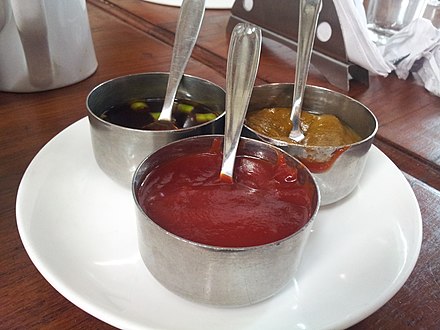Salsa golf
 Salsa golf served at a "taste-off" in Buenos Aires | |
| Type | condiment |
|---|---|
| Place of origin | Argentina |
| Created by | Luis Federico Leloir |
| Main ingredients | mayonnaise, ketchup, pimento, oregano, cumin |
Salsa golf is a cold sauce of somewhat thick consistency, common in Argentina. It is made from mayonnaise with a smaller amount of tomato-based sauce such as ketchup, as well as seasonings including pimento, oregano, and cumin.
Origin
According to legend, the sauce was invented by the physician Luis Federico Leloir in the mid-1920s at the golf club of the seaside resort Mar del Plata. Tired of eating shrimp and prawn with mayonnaise, he asked the waiter to bring various ingredients (vinegar, lemon, mustard, ketchup, and others) and experimented with different mixtures. The favourite was ketchup and mayonnaise. Leloir's companions named the result salsa golf, and its fame grew.[1][2][3] Soon it spread to neighboring Uruguay[4] while also being common in Chile.
Recipes
There are several recipes, but the sauce is always mostly mayonnaise with a tomato-based sauce like ketchup. Seasoning is added to give the sauce an Argentine flavor, such as pimento, oregano, and cumin. The mixture can also include Worcestershire sauce and mustard.[5]
Salsa golf is used to dress salad, meat, and other food, and it is the main ingredient in a typical Argentine dish called palmitos en salsa golf.
In neighboring Paraguay, salsa golf is also very popular and is sometimes eaten as a delicacy with quail eggs. In countries outside South America, salsa golf is more commonly known as Marie Rose sauce or fry sauce.
The Argentine dish revuelto Gramajo is often served with this sauce.[5]
See also
- Comeback sauce
- Fry sauce
- Marie Rose sauce
- Russian dressing
- Thousand Island dressing
- List of dips
- List of sauces
References
- ^ Exton, John H. (2013). Crucible of Science: The Story of the Cori Laboratory. Oxford University Press. p. 45. ISBN 9780199861088. Retrieved 22 October 2018 – via Google Books.
- ^ Ego Ducrot, Victor (1998). Los sabores de la Patria: Las Intrigas de La Historia Argentina Contadas Desde La Mesa y La Cocina [The Tastes of the Homeland: The Intrigues of Argentine History Counted From The Table and The Kitchen] (in Spanish). Grupo Editorial Norma. ISBN 9789580447030.
- ^ Rosen, Marty (April 2, 2010). "Restaurant Review - Palermo Viejo: The allure of Argentina". Louisville Courier-Journal.
- ^ Univision. "Salsa Golf. No es para jugar, es para aderezar". Univision (in Spanish). Retrieved 2023-03-17.
- ^ a b Jacob, Jeanne; Ashkenazi, Michael (2014). The World Cookbook: The Greatest Recipes from Around the Globe. ABC-CLIO. pp. 46–47. ISBN 9781610694698 – via Google Books.
